From prayer to prairie
Bright clusters of Virginia bluebells and the star-shaped lemon-yellow blooms of marsh marigold greet Marianist Sister Leanne Jablonski ’85 as she walks a meandering pathway through woodlands at the Society of Mary’s Mount St. John oasis a few miles east of the UD campus. It’s spring, and nature is putting on its usual colorful show.
Emerging from the forest filled with native plants and trees, Jablonski looks out over a restored grassland prairie coming to life in the bright afternoon sun. The renewed 14-acre prairie sits atop a borrow pit that yielded 75,000 cubic feet of sand and gravel for the construction of adjacent Interstate 675.
The overlook gives Jablonski director of the Marianist Environmental Education Center housed on the property, a deep sense of satisfaction. It’s a place where she feels the embrace of Mother Earth; she offers a prayer of appreciation for the beauty of the diverse plant and animal life at the 147-acre nature reserve, known as MEEC.
“It’s a time of renewing my friendships with all life and renewing my commitment to care for God’s creation,” Jablonski said of her walks. “And I ask for guidance in the work that we are doing.”
That work is part of the care for all God’s creation, an increasingly common pursuit for Catholic sisters around the world. Heeding the call of Pope Francis, many U.S. religious orders of women are conserving energy, reducing waste and plastic usage, lowering dependence on fossil fuels, installing solar panel arrays and adding electric vehicles to their fleets, actions aimed at slowing global warming. Their actions are both spiritual and practical, and the results they are achieving offer models for how others consider both the environment and the most vulnerable among us.
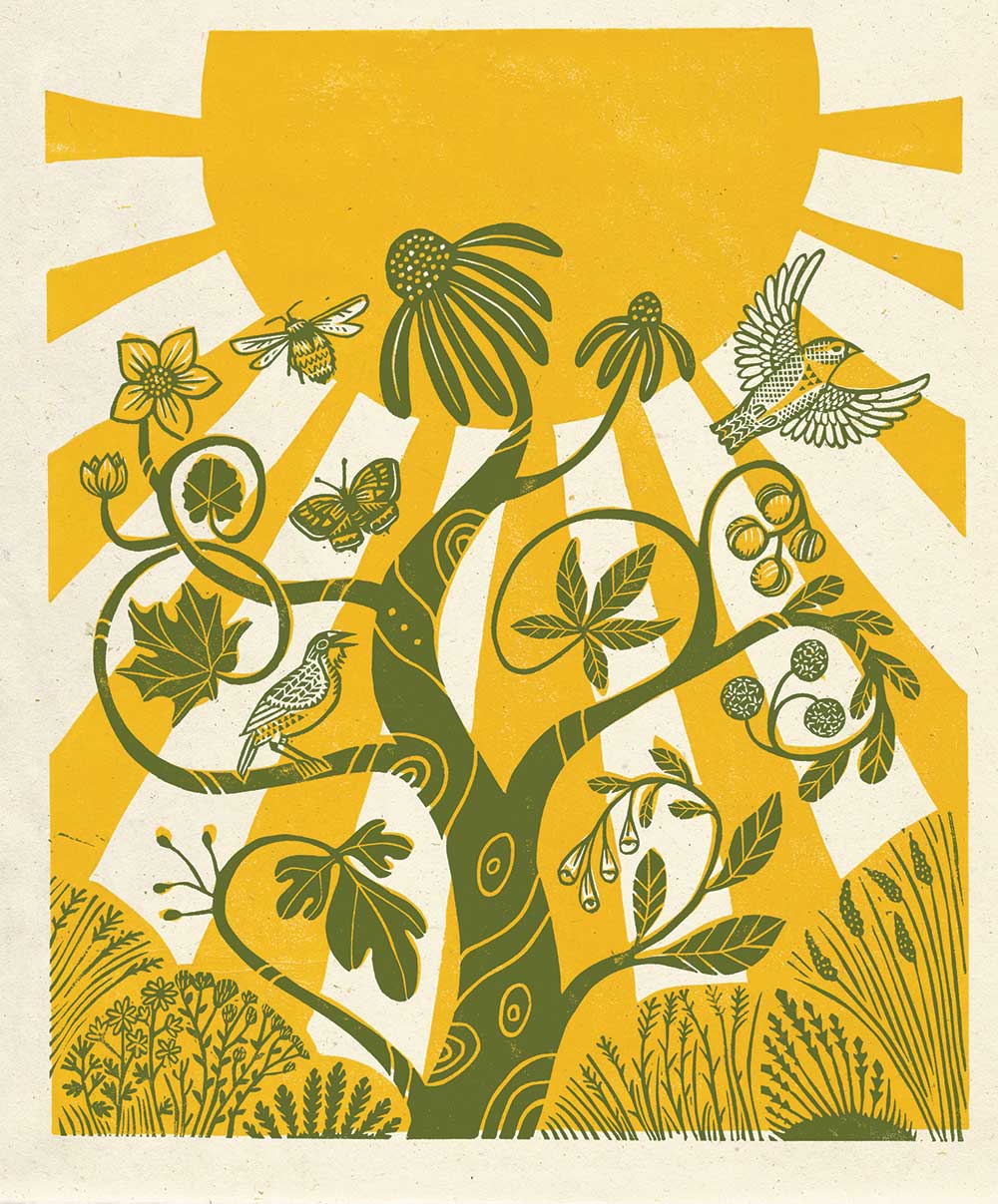
The prairie
Jablonski, an ecologist who is a scholar for faith and the environment within UD’s Hanley Sustainability Institute, has devoted her life to protecting creation and addressing climate change. Her multiple roles — a ministry she described as built on the rich tenets of Catholic Social Teaching and the charism of her order, the Daughters of Mary Immaculate — allow for opportunities to educate, raise awareness and undertake hands-on work for Earth.
“My call is coming from God and it’s been mediated through the ecosystems, the creatures, the plants and the animals consistently,” explained the native of Winnipeg, Manitoba, who holds a master’s degree in biology and also earned a master’s in
pastoral ministry in 1991, both from UD.
The one thing she has come to understand through her work: “Everything is connected.”
It’s a sentiment that Pope Francis calls “integral ecology” in his encyclical Laudato Si’, on Care for Our Common Home. In urging a conversion of attitudes to foster care and tenderness in the world, he writes, “we are not disconnected from the rest of creatures but joined in one splendid universal communion.”
Jablonski’s communion with nature blossomed during the 1970s when she worked as a naturalist in the Manitoba provincial park system. Her love deepened while working as a lab assistant at the University of Manitoba, seeing the symmetry between her Catholic beliefs and ecology after joining a Bible study group that included scientists who seamlessly connected their work with their faith.
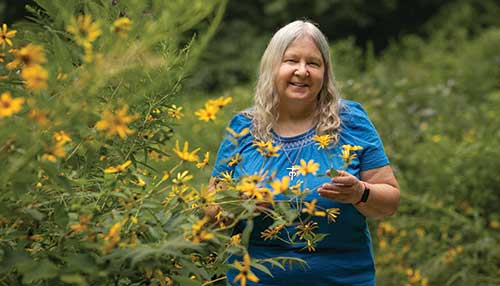
Along her journey, Jablonski met Marianist brothers and sisters and realized she was being called to religious life. She made first vows as a Marianist in May 1982.
For years though, she had heard about the environmental work of Marianist Brother Don Geiger ’55 at UD and made her way to campus to pursue a master’s degree in biology under his guidance beginning in fall 1982.
It was not until 1992 that Geiger founded MEEC. The Society of Mary, which bought the Mount St. John property in 1910, maintains ties with MEEC. Geiger had long envisioned that the land could become a nature reserve, birthed from the farm that had been there for more than five decades. Reseeding the borrow pit with native grasses was one of his first projects. It became a model for restoration efforts elsewhere.
Jablonski worked as a lab instructor and coordinator in UD’s biology department from 1985 to 1991. In 1988 she made her final vows as a sister. She completed a doctorate in plant physiological ecology and global climate change at McGill University in Montreal in 1997. She joined MEEC in 1998 as an associate director and became director in 2002.
Two other UD alumni work with Jablonski at MEEC: Tara Poling ’95 is program coordinator and has been on board for 21 years. Michele Banker ’95 is land resource coordinator and joined the staff after completing her graduate degree in biology from UD in 1998.
Poling described the trio’s work as “prophetic” because it is rooted in the Marianist charism.
“Their (the Marianists) willingness to look at, examine and minister on the edges of society with the economically poor, with the environment, meeting needs that are not often a priority sometimes for the larger church unfortunately,” she said.
Women in the forefront
Jablonski is among a broad network of women religious who for decades have emphasized care for the environment while building awareness that everyone is responsible for Earth’s health.
Such beliefs have received regular boosts from Pope Francis. His encyclicals, Laudato Si’ in 2015 and Fratelli Tutti, on Fraternity and Social Friendship in 2020, have stressed the interconnection of humans wi th each other and with the planet.
Seeing those connections and inspired by the documents of the Second Vatican Council that encouraged wider engagement with the world, women religious have stepped up, as they have throughout history, to address contemporary social concerns in line with their charisms. History documents efforts to open hospitals, schools and nursing homes, comfort immigrants, house the unhoused and promote civil rights. Creation care and environmental protection are joining the historical record.
Precious Blood Sister Mary Ann Mozser ’63 was an educator at Our Lady of Good Counsel School in Cleveland for 17 years before serving as vice president for mission and ministry at St. Vincent Charity Hospital in Cleveland. She recalled teaching children as early as the 1970s “to appreciate the world and take care of it.”
“We did basic conservation kinds of things. We were trying to teach the children to take care of people, first and foremost, and the animals and creation because we share the planet,” said Mozser, now retired and living at her order’s Salem Heights motherhouse in the Dayton suburb of Trotwood.
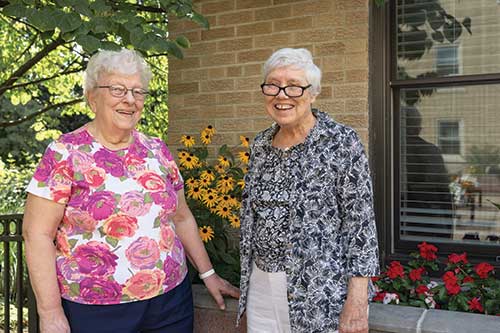
Such work comes out of the experiences of women religious in the various ministries in which they have undertaken since Vatican II, explained Precious Blood Sister Mary Wendeln ’68. “It wasn’t just out of the blue,” she said.
Having grown up on a farm near Columbus Grove, Ohio, fellow Precious Blood Sister Mary Lou Schmersal ’65 understands the predicament small farmers around the globe face in a warming world. She experienced the difficulties her family faced when fields flooded or the heat was searing and knows those instances are much more severe today on a global scale.
Her experience helped in the Linton, North Dakota, classroom where she led lessons in seed sprouting and the hatching of chicks to help students understand the intricacies of how nature works.
Her bottom line: “If we don’t take care of the earth, that’s it.”
Vatican initiative
The looming environmental crisis is being directly addressed within the Catholic Church through a Vatican initiative, the Laudato Si’ Action Platform. It finds church-connected entities — universities, parishes, schools, dioceses, religious orders and nonprofits — educating about the negative effects of climate change, especially in the developing world, and undertaking steps locally to mitigate it.
In March, UD hosted the launch of the Cincinnati Archdiocese’s involvement in the platform. The daylong program attracted nearly 200 attendees who heard from speakers and joined workshops that addressed local action.
Coordinated through the Vatican Dicastery for Integral Human Development, the platform is “a seven-year journey that will see our communities committed in different ways to becoming totally sustainable, in the spirit of integral ecology,” the pope said in a video introducing it in May 2021.
Because the MEEC staff was already doing the kind of work the pope envisions, Jablonski worked with the archdiocese to bring the launch event to UD.
Ursuline Sister Christine Pratt, coordinator of the eastern region for the archdiocese’s Social Action Office, has worked with Jablonski on the archdiocese’s Care for Creation Task Force. She said the prominent role of women religious on environmental concerns emerges from each respective congregation’s charism.
“For us, the Laudato Si’ Action Platform is important because it is putting into effect within the Catholic community a call to everyone, to take leadership on moving forward on care for creation and those who are most vulnerable.”
“It’s not just about a bunch of words but being able to set up processes and programs and movement that will have a long-term effect on climate change and care for the people who are most affected by it,” she explained.
Likewise, Marianist sisters worldwide joined the platform’s commitment to environmental justice and integral ecology during the order’s 33rd general chapter in July 2022. Marianist Sister Clotilde Fernández del Pozo, education assistant for the order in Rome, said the congregation spoke with its members to understand how they were responding to local environmental challenges.
“We need to mission in a certain way and show and communicate we are improving our integral ecology life,” she said.
Such work also requires a deepening of the understanding of the order’s charism, Fernández del Pozo explained.
“It’s important because we make our identity stronger. We can serve better the needs of the world if we are deepening our own identity and the connection with the social teaching of the Church,” said Fernández del Pozo, who with Jablonski and others, helped write the chapter document with its focus on integral ecology.
Work on the environment has spread throughout the Marianist community. In addition to the Society of Mary and Daughters of Mary Immaculate, the Marianist Social Justice Collaborative, Marianist Lay Communities of North America and Marianist Family Encounter Project are incorporating integral ecology into their activities.
Marge Cavanaugh, a member of the UD board of trustees, chairs the Marianist Social Justice Collaborative. A chemist who worked at the National Science Foundation, Cavanaugh said Marianist spirituality and the sense of nurturing and community building it entails is evident in the work throughout the Marianist family.
“The earth is really sacred, and a lot of that is a kind of mystical view of things. It has to do with the fact that Christ was human. He’s made of the earth. He makes it sacred. And Mary was the instrument of that,” said Cavanaugh, who studied at UD before completing her undergraduate degree at the University of Pittsburgh.
“Once you get to that point where you tie those things together, I think environmental care becomes a part of your way of being religious or exercising your sense of a larger humanity.”
Next generation
A younger generation of women religious have embraced the concern for the environment as well in a new wave of ministries.
Providence Sister Tracey Horan ’10, associate director of education and advocacy at the Kino Border Initiative in Nogales, Arizona, experienced a series of “awakenings” beginning as a UD student that eventually led her to minister alongside Central American migrants.
Her journey began by joining the River Stewards program through UD’s Rivers Institute, a venture focusing on the Great Miami River watershed and its importance to the Dayton area. A weeklong river outing led her to develop a watershed education program for Dayton public school students while working as an institute intern.
Horan’s life took various turns: first as a teacher and then a year at the Sisters of Providence’s White Violet Center for Eco-Justice, near Terre Haute, Indiana, where she discerned her religious vocation. She also worked as a community organizer in her hometown of Indianapolis before heading to Arizona.
Through it all, Horan saw the “intersectionality” — the interconnected nature — of the challenges of migration, climate change and poverty.
She attributed the migrant surge in part to back-to-back hurricanes in 2020 that inundated Central America, destroying crops and homes. Couple the storms with the demands of criminal gangs that are part of daily life, and people made the agonizing decision to trek northward, she said.
“You have people who might say they’re coming because of the violence. But ask a few more questions, they say it used to be they had a good enough crop yield and even if criminals are asking for a quota, they could pay and everything was somewhat stable,” she said. “Add in that you don’t have a stable income (because) you lose your crop or there’s fear of drought, all of a sudden you can’t pay that quota and you’re facing that threat you wouldn’t have otherwise.
“You’re layering that ecological piece with the instability and the corruption that exist and that makes it an untenable situation for a lot of folks.”
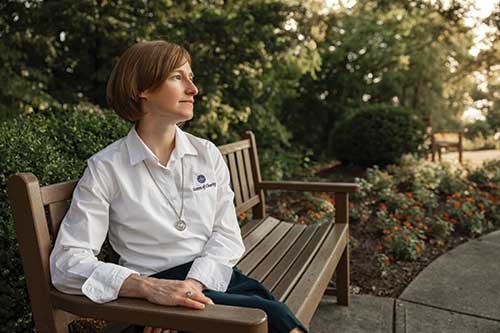
For Sister Annie Klapheke ’08, a member of the Sisters of Charity of Cincinnati, a course on religion and ecology taught by Jablonski led to “awakening me to issues of environmental sustainability and our role in stewarding the earth and how it connects to our faith and beliefs,” she said.
Today, Klapheke works as a registered dietician at the Good Samaritan Health Center in Cincinnati, which serves people without health insurance. She counsels patients struggling with diabetes, hypertension, obesity or other chronic illnesses about the importance of good nutrition. She encourages them to steer clear of low-cost, highly processed, high-calorie and nutrient-poor food. The center’s “produce prescription” program provides clients with vouchers to select fresh fruit and vegetables from a market operated by a local food bank.
In addition, Klapheke volunteers at her order’s EarthConnection environmental center. It operates an organic garden, which grows food for area food banks and health center clients. She realizes that fresh food is better for the planet because it requires less processing and packaging.
“We’ve got one planet. The impacts of human behavior are undeniable with so much scientific evidence. Nature’s resilient and has the ability to recover, but it can only go so far. If we don’t change the way we’re impacting the environment, it’s going to have dire effects,” she said.
Connections
Understanding connections has been enlightening for Mackenzie Doyle ’23, who recently completed work on a master’s degree in pastoral ministry. She began working for the Sisters of Charity of Cincinnati in August as their justice promoter and is facilitating the formation of justice circles focusing on the environment and climate change, immigration, poverty, peacemaking and racial inequality.
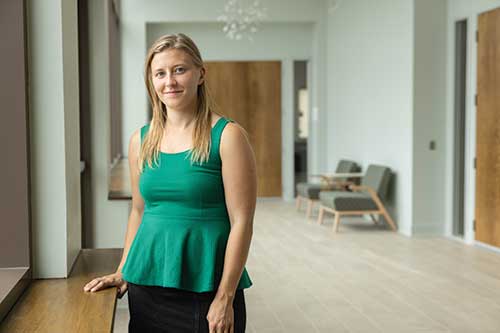
A native of the Chicago suburb of Downers Grove, Doyle said her new position is far different than the 14 months she spent as a police officer in Madison, Wisconsin, after graduating from Iowa State University. In that job Doyle witnessed the wide divide between wealth and poverty.
“I encountered and talked to people who had a very different life experience than my own. It was weird because I was like, I’m in a position of power, but I feel powerless to really help,” she said.
Doyle turned to parish ministry, returning to Chicago during the pandemic to become a pastoral associate at Old St. Patrick’s Church. Her work took her into predominantly Black and Latino low-income neighborhoods.
“They were some of the kindest humans I’ve ever met. It just shattered a lot of stereotypes and biases that I had,” she said.
Doyle enrolled at UD in August 2021 and soon was introduced to Jablonski’s ecological ministry. Doyle quickly realized “everything is connected.”
“I was just like, wow, I didn’t even know that was possible. That stuck with me. I was someone who is always connected to God the most in nature and creation. I always thought I was a little odd for that, I guess, but no, not really,” Doyle said.
For her work with education and ministry, Jablonski received an honorable mention from Climate Catholic Covenant’s 2023 Laudato Si’ Champion Awards.
Back at Mount St. John, the MEEC staff welcomes visitors and volunteers, including UD students and alumni, to make the connections like Doyle has and to take a step toward practicing integral ecology.
Jablonski said people can help raise native plants in the nursery that will be placed throughout Mount St. John; clear invasive species; monitor the birds, insects, butterflies and other critters that call the reserve home; or walk the grounds to pray or read Scripture.
The work, she said, is about helping people find the “universal experiences that bring us together so that then we can join and care together from all persuasions.”
“It’s helping people see the connections.”
Illustration by Becca Thorne
Photographs by Angie Lipscomb Photography
Dennis Sadowski is a freelance writer in Avon, Ohio. He has worked as a journalist and in communications for 45 years, including 25 years in Catholic media.